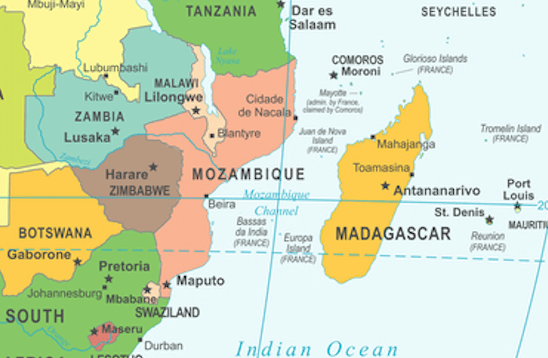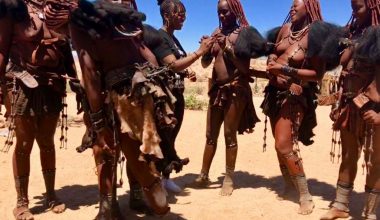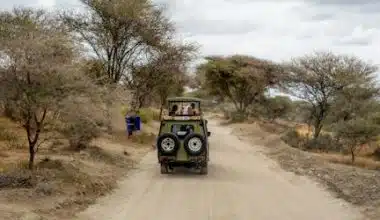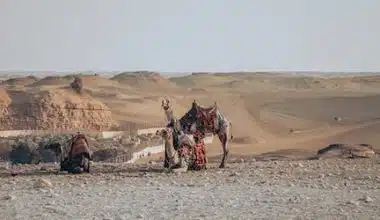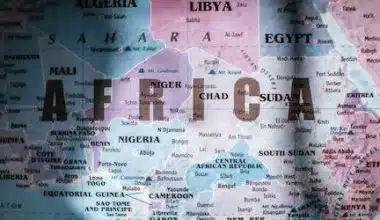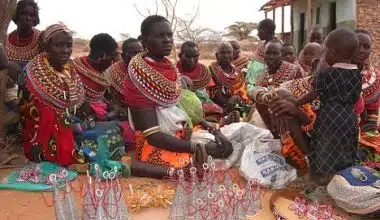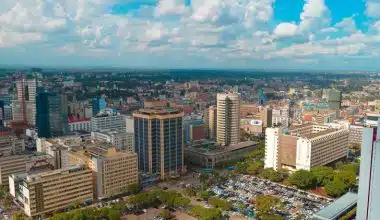Let’s delve into the wonders of this singular destination that is situated off the southeastern coast of Africa and explore the answer to the question: Is Madagascar a country? Madagascar is an island country off the southeastern coast of Africa, the fourth largest in the world. Its capital is Antananarivo, with a population of 29,892,000. The country is known for its unique ecology, biodiversity, and diverse culture. Madagascar has a diverse climate, offering attractions for tourists and maintaining diplomatic relations with various countries. Wondering if Madagascar could be your best next location for vacation? This article provides the right answer.
Is Madagascar A Country?
Yes, Madagascar is a country. It is an island country located off the southeastern coast of Africa in the Indian Ocean. It is the fourth-largest island in the world, after Greenland, New Guinea, and Borneo. Madagascar has its own government, with President Andry Rajoelina and Prime Minister Christian Ntsay leading the country since January 2019. The capital city of Madagascar is Antananarivo.
Things to Know About Madagascar as a Country
#1. Geography and Biodiversity
Madagascar is an island country located off the southeastern coast of Africa in the Indian Ocean. It is the fourth-largest island in the world and is known for its unique ecology and biodiversity. Approximately 90% of all plant and animal species found in Madagascar are endemic, meaning they are found nowhere else on Earth.
#2. Capital and Population
The capital city of Madagascar is Antananarivo. The country has a population of approximately 29,892,000 people as of 2023.
#3. Culture and Cuisine
Madagascar has a rich and diverse culture. The country is known for its unique traditions, music, dance, and art. African, Arab, Indian, and French flavors are all present in Malagasy cuisine. Some popular dishes include romazava (a meat and vegetable stew), ravitoto (pork and cassava leaves), and zebu steak.
#4. History
Humans have lived in Madagascar for about 1,300 years. The first settlers are believed to have arrived from Indonesia in Southeast Asia. The island was invaded by France in 1883 and it officially became a French colony in 1896. Madagascar gained independence in 1960.
#5. Climate
Madagascar has a diverse climate. The east coast has a sub-equatorial climate with heavy rainfall, while the west coast is generally drier. The southwest and extreme south of Madagascar are semi-desert environments with lower rainfall. The average annual temperatures vary between 23°C and 27°C along the coast and between 16°C and 19°C in the central mountains.
#6. Tourism
Madagascar offers a range of attractions for tourists. The country is known for its beautiful beaches, unique culture, amazing food, and wonderful scenery. Visitors can also enjoy wildlife encounters, such as swimming with whale sharks, observing lemurs, and exploring national parks.
#7. International Relations
Madagascar is a member of the United Nations and maintains diplomatic relations with various countries. The country has an embassy in the United States and is engaged in international partnerships and collaborations.
#8. Government and Leadership
Madagascar has a democratic government. The head of state is President Richard Ravalomanana (acting) and the head of government is Prime Minister Christian Ntsay.
#9. Language
The official languages of Madagascar are Malagasy and French. The majority of people in Madagascar speak Malagasy, while French is the language of business, government, and education.
#10. Economy
The economy of Madagascar is primarily based on agriculture, with the majority of the population engaged in subsistence farming. The country exports agricultural products such as vanilla, cloves, and coffee. However, Madagascar faces economic challenges, including limited infrastructure and high poverty rates.
Challenges of Madagascar as a Country
#1. High Poverty Rates
Madagascar has one of the highest poverty rates in the world. Despite considerable natural resources, the population of about 28 million people faces significant economic challenges, including sluggish growth and persistent poverty.
#2. Food Insecurity
The country experiences food insecurity, with approximately 1.64 million people in need of humanitarian assistance. In the Grand Sud region, 334,000 people are facing an emergency level of food insecurity.
#3. Political Instability
Madagascar has faced political instability, which undermines government institutional capacity, economic growth, and development efforts. It also reduces people’s access to basic services and their ability to prevent and recover from frequent shocks, such as climate-related disasters.
#4. Limited Institutional Capacity
Political instability has hampered the nation’s institutional capacity, which hinders effective governance and development initiatives.
#5. Climate Change Vulnerability
Madagascar is among the ten countries most vulnerable to disasters and is considered the most cyclone-exposed country in Africa. A quarter of the population lives in areas highly prone to cyclones, floods, or droughts. Climate change poses significant challenges to the country’s development and resilience.
#6. Access to Basic Services
Limited access to basic services, such as healthcare, education, and clean water, is a challenge for many people in Madagascar.
#7. Environmental Conservation
Deforestation, habitat loss, and illegal wildlife trade are threats to Madagascar’s unique biodiversity. Conservation efforts face challenges due to limited resources and capacity.
#8. Infrastructure and Development
Madagascar faces challenges in infrastructure development, including limited road networks, electricity access, and telecommunications coverage. These limitations hinder economic growth and development.
#9. Healthcare Challenges
The country’s healthcare system faces challenges, including limited access to quality healthcare services, especially in rural areas. Outbreaks of infectious diseases, such as plague, have also been a concern.
#10. Economic Vulnerability
Madagascar ranks among the poorest countries in the world, with over 80% of the population living under the extreme poverty line of USD 1.25 per day. The country’s economy heavily relies on agriculture, which is vulnerable to climate change, market fluctuations, and limited access to credit and resources.
Is Madagascar A Country In Africa?
Madagascar is a country in Africa. It is situated off the southeast coast of the continent in the Indian Ocean. It is considered part of the African region and is a member of the African Union and the United Nations. The capital city of Madagascar is Antananarivo. The country has a population of approximately 29,892,000 people as of 2023. Madagascar faces various challenges, including high poverty rates, food insecurity, political instability, climate change vulnerability, limited access to basic services, environmental conservation, healthcare challenges, and economic vulnerability.
Requirements to Travel to Madagascar as a Country in Africa
When planning to travel to Madagascar, it is important to be aware of the requirements and considerations for a smooth and safe journey.
#1. Passport and Visa
Ensure that your passport is valid for at least six months beyond your intended departure date from Madagascar. Most visitors to Madagascar require a visa, which can be obtained in advance from a Malagasy embassy or consulate or upon arrival at the airport.
#2. Health Precautions
Madagascar is a country with certain health risks. It is advisable to consult with a healthcare professional or travel clinic to receive up-to-date information on recommended vaccinations and health precautions. Malaria is prevalent in certain areas, so taking appropriate anti-malarial medication and using insect repellent is essential. It is also important to follow guidelines for food and water safety to prevent gastrointestinal illnesses.
#3. Travel Insurance
It is advised to have travel insurance that covers medical expenses, trip cancellation or interruption, and emergency evacuation. Ensure that the insurance policy provides adequate coverage for the duration of your stay in Madagascar.
#4. Safety and Security
Stay informed about the current security situation in Madagascar by checking travel advisories issued by your government or relevant authorities. Exercise caution, particularly in crowded areas, and be aware of your surroundings. It is advisable to take precautions to safeguard your personal belongings and avoid displaying signs of wealth.
#5. Transportation
Public transportation in Madagascar, such as taxis and buses, may not be well-equipped to accommodate passengers with disabilities. The country lacks sidewalks in most areas, and roads can be hazardous for pedestrians. If you have accessibility needs, it is important to plan accordingly and consider private transportation options.
#6. Climate and Weather
Madagascar has a diverse climate, and weather conditions can vary depending on the region and time of year. It is advisable to check the weather forecast and pack appropriate clothing and gear for the specific season and activities you plan to engage in during your visit.
#7. Local Customs and Etiquette
Familiarize yourself with the local customs and cultural norms of Madagascar to ensure respectful interactions with the local population. It is advisable to dress modestly, especially when visiting religious sites or rural areas. The locals will also appreciate learning a few fundamental phrases in Malagasy.
#8. Currency and Banking
The official currency of Madagascar is the Malagasy Ariary (MGA). It is recommended to carry some local currency for small purchases and in areas where credit cards may not be widely accepted. ATMs are available in major cities, but it is advisable to inform your bank about your travel plans to avoid any issues with card usage.
#9. Conservation and Environment
Madagascar is known for its unique biodiversity, and it is important to respect and protect the environment during your visit. Follow responsible tourism practices, such as not disturbing wildlife or damaging natural habitats. Be mindful of waste management and use eco-friendly products when possible.
#10. Freshwater Precautions
Contact with untreated freshwater, such as lakes, rivers, and ponds, should be avoided to reduce the risk of waterborne diseases. This includes activities like swimming, bathing, or ingesting untreated freshwater. It is advisable to consume safe and treated water during your stay in Madagascar.
Things to Do in Madagascar as a Country in Africa
Madagascar offers a range of unique experiences and attractions for visitors. Here are some things to do in Madagascar:
#1. Explore National Parks
Madagascar is renowned for its diverse and endemic wildlife. Explore national parks such as Ranomafana, Andasibe-Mantadia, and Isalo to spot lemurs, chameleons, and other fascinating creatures.
#2. Visit Tsingy de Bemaraha
Discover the otherworldly landscape of Tsingy de Bemaraha National Park, a UNESCO World Heritage Site. Explore the sharp limestone formations, hike through canyons, and witness the unique flora and fauna.
#3. Relax on Beautiful Beaches
Madagascar boasts stunning beaches along its coastline. Visit places like Nosy Be, Ifaty, and Anakao to relax on pristine sandy shores, swim in turquoise waters, and enjoy water activities like snorkeling and diving.
#4. Experience the Avenue of the Baobabs
Witness the iconic Avenue of the Baobabs near Morondava. These ancient baobab trees create a captivating landscape, especially during sunrise and sunset.
#5. Discover Cultural Heritage
Immerse yourself in the rich cultural heritage of Madagascar. Visit local villages, interact with the friendly Malagasy people, and experience traditional music, dance, and cuisine.
#6. Explore the Capital City
Spend time in Antananarivo, the capital city of Madagascar. Visit historical sites like the Royal Palace, explore local markets, and sample delicious Malagasy street food.
#7. Go Whale Watching
If you visit between July and September, head to the coastal areas of Madagascar for a chance to witness humpback whales during their migration. Whale-watching tours are available in places like Sainte Marie and Nosy Be.
#8. Discover Unique Landscapes
Madagascar offers diverse landscapes, from lush rainforests to arid deserts. Explore the surreal landscapes of Isalo National Park, the dense rainforests of Masoala National Park, or the spiny forests of Ifaty.
#9. Engage in Water Sports
Madagascar’s crystal-clear waters provide opportunities for various water sports. Go snorkeling or diving to explore vibrant coral reefs, or try your hand at kayaking, windsurfing, or paddleboarding.
#10. Trekking and Hiking
Embark on adventurous treks and hikes in Madagascar’s national parks and nature reserves. From challenging hikes to multi-day treks, there are options for all levels of fitness and experience.
Is Madagascar a Country or a City?
Madagascar is a country, not a city. It is an island country located off the southeastern coast of Africa in the Indian Ocean. The capital city of Madagascar is Antananarivo, which is situated in the central part of the island. The country is the fourth-largest island in the world and has its own distinct culture, language, and traditions. Madagascar is home to various endemic plants and animals found nowhere else on Earth. The country has a population of approximately 29,892,000 people as of 2023.
Is Madagascar A Rich Or Poor Country?
Madagascar is one of the poorest countries in the world. Despite having considerable natural resources and a tourism industry driven by its unique environment, poverty remains widespread in the country. The economy of Madagascar is largely dependent on agriculture, particularly rice cultivation. The country has a high poverty rate, with a significant portion of the population living below the poverty line The average income in Madagascar is relatively low, with the current average income estimated to be around $1.60 per day.
Is Madagascar Part Of Africa Or India?
Madagascar is a country located off the southeastern coast of Africa in the Indian Ocean. It is not part of India. The island is situated off the coast of southern Africa and is considered part of the African continent. The country has its own distinct culture, language, and traditions and is known for its unique biodiversity and stunning landscapes.
Is Madagascar A Fully Independent Country?
Yes, Madagascar is a fully independent country. It gained independence from France on June 26, 1960 Since then, Madagascar has been a sovereign nation with its own government, institutions, and international recognition. It is a member of various international organizations, including the United Nations and the Commonwealth of Nations However, it is important to note that Madagascar has faced political instability and challenges in its post-independence history, including periods of political unrest, coups, and disputed elections. Nonetheless, it remains an independent country with its own governance and decision-making authority.
What’s The Currency In Madagascar?
The currency in Madagascar is the Malagasy Ariary (MGA). It is the official currency of the country and is used for all transactions within Madagascar. The currency’s symbol is “Ar,” and the smaller units are known as iraimbilanja. The most accepted foreign currencies for exchange in Madagascar are the Euro, US dollars, and British pounds. Banks and ATMs are available for currency exchange and cash withdrawals.
Is Madagascar A US State?
No, Madagascar is not a US state. It is an independent country located off the southeastern coast of Africa in the Indian Ocean. It is not part of the United States or any other country. Madagascar has its own government, institutions, and international recognition. It gained independence from France on June 26, 1960, and has been a sovereign nation since then. The United States maintains diplomatic relations with Madagascar and has an embassy in the capital city of Antananarivo.
Conclusion
Madagascar offers a variety of unique experiences for visitors, including exploring national parks, visiting UNESCO World Heritage sites, relaxing on beautiful beaches, experiencing the Avenue of the Baobabs, immersing in the rich cultural heritage, exploring the capital city, whale-watching, and exploring unique landscapes like Isalo National Park and Masoala National Park. These issues hinder economic growth, development efforts, and access to basic services. To travel to Madagascar, ensure a valid passport, follow health precautions, and have travel insurance covering medical expenses, trip cancellations, and emergency evacuations.
- TRAVELING TO EGYPT: From Pyramids to Nile Cruises, and Beyond
- EAST AFRICAN COUNTRIES: The Ultimate List
- IS MAURITIUS SAFE? All You Need To Know
